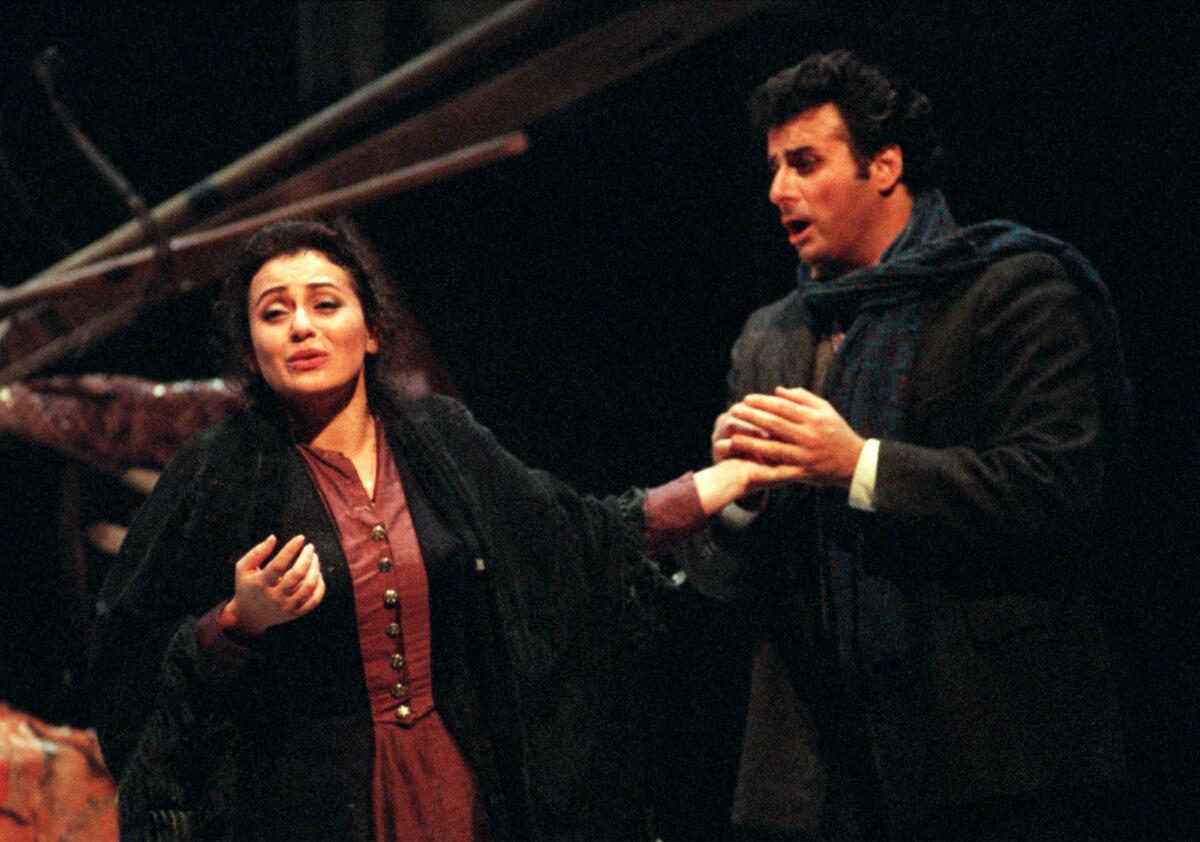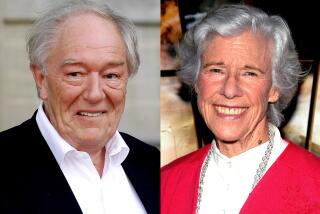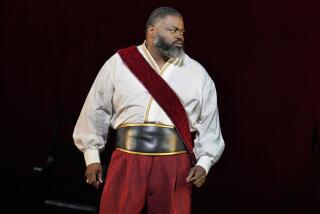Marcello Giordani, tenor who became global opera star, dies at 56

- Share via
Tenor Marcello Giordani, renowned for a voice of heft and beauty that made him a star at the world’s top opera houses, has died at his home in Sicily. He was 56.
Giordani had a heart attack Saturday following lunch at his home in Monte Tauro, a suburb of Augusta in Sicily, and could not be revived, said his vocal coach, Bill Schuman.
“I talked to his wife, Wilma,’” Schuman said. “He said he was thirsty, got up from his chair for some water and collapsed. They had a helicopter-ambulance come in, but he was already gone.”
In an era when the Three Tenors waned in the 1990s and 2000s, Giordani was sought after in lyric and later spinto roles.
“It’s a tragic loss,” soprano Renée Fleming, a frequent singing partner, wrote in a text, recalling him as “a remarkably lovely man.”
“He possessed the easiest, most clarion high notes, and was convincing in every role,” she said.
Born in Sicily on Jan. 25, 1963, Giordani was the son of a prison guard who later in life operated a gas station.
“That’s mostly where I made my debut, making coffee,” he said in a 2007 interview. “People still remember me when I was 12 or 13, singing or bringing coffee.”
He moved to Milan when he was 23. He made his professional debut as the Duke in Verdi’s “Rigoletto” at Spoleto, Italy, in 1986, and sang his first performance at Milan’s Teatro alla Scala as Rodolfo in Puccini’s “La Boheme” in 1988.
His American debut followed as Nadir in Bizet’s “Les Pecheurs de Perles (The Pearl Fishers)” at the Portland Opera during the 1988-89 season, and he made his first appearance at the Vienna State Opera in 1992 as the Italian Singer in Strauss’ “Der Rosenkavalier.”
Giordani considered the key to his career his move to New York in 1994, when he began studying with Schuman. Conductor Riccardo Muti told Giordani he needed to improve his technique, and Giordani’s agent, Matthew Laifer, directed the tenor to Schuman.
Giordani called Schuman “my miracle, my blessing.”
Debuts followed in 1995 at London’s Royal Opera as Alfredo in Verdi’s “La Traviata” with conductor Georg Solti and at New York’s Metropolitan Opera as Rodolfo.
He sang Gabriele Adorno in Verdi’s “Simon Boccanegra” at Covent Garden in 1997 during Solti’s final opera performances before his death that September. In 2003, he sang Henri at the Paris Opera’s first production since 1863 of the original French version of Verdi’s “Les Vepres Siciliennes.”
Giordani became a regular at the Met, singing 241 performances through the 2015-16 season and often moving his family to a New York apartment for either the autumn or spring portion of the season.
He sang Pinkerton in Puccini’s “Madama Butterfly” in the opening night of the 2006-07 season in the premiere of Anthony Minghella’s production.
“He was able — and I think this is unusual — to surrender any preconceptions he had about a role he has sung many times before and arrive in our production as an enthusiastic innocent,” Minghella said.
That high-profile night, led by music director James Levine, was the first performance of Peter Gelb’s term as general manager.
“Certainly the top of his voice is incredible,” Gelb said then. “He is a great singer, a great artist.”
That same year, Giordani performed in the Great Hall of the U.S. Supreme Court at the invitation of Justice Ruth Bader Ginsburg.
Giordani later ranged into some heavier roles, including Don Jose in Bizet’s “Carmen” and the Aeneas in Berlioz’s “Les Troyens.”
“I think I’m pretty able to understand what is good for me to sing or not,” Giordani said. “I’m in the business for almost 20 years. I could sing the heavy repertoire 10 years ago, but I decided, ‘Don’t do it’ because I saw many, many singers fall down choosing the heavy repertoire, make a huge amount of money in five years and then disappear.”
Yet, age took a toll, and he lessened his appearances on the major stages in recent seasons. He established the Marcello Giordani Foundation to support young singers.
“His choice to create a foundation in support of young singers at such an early age was unusual,” Fleming said.
He is survived by his wife, Wilma, and sons Michele and Gerard Andre.
More to Read
Start your day right
Sign up for Essential California for the L.A. Times biggest news, features and recommendations in your inbox six days a week.
You may occasionally receive promotional content from the Los Angeles Times.






